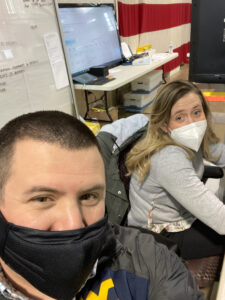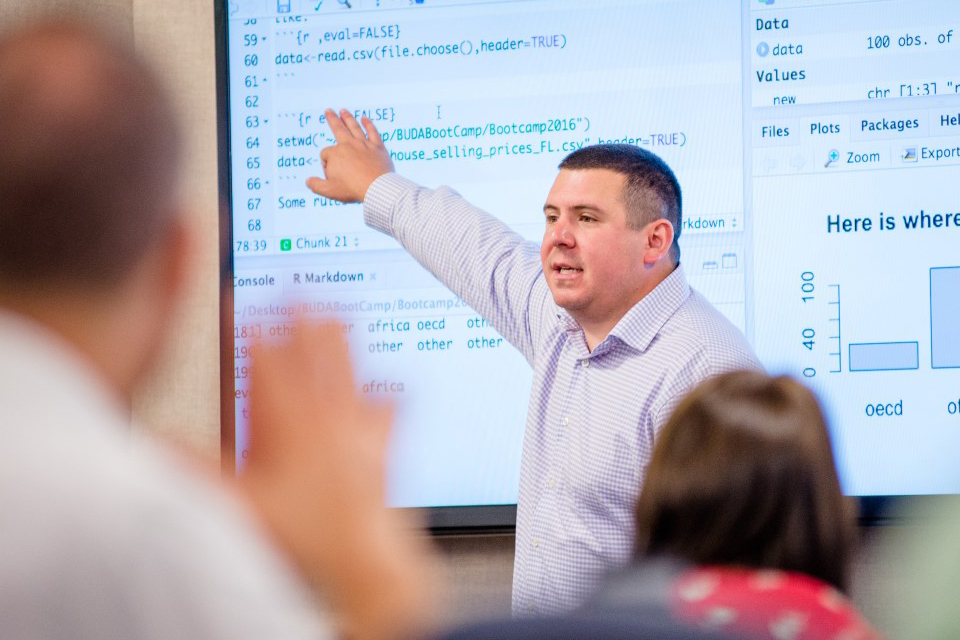A Story of COVID-19, Mentoring, and West Virginia
Snehalata Huzurbazar spent 22 years in the statistics department at the University of Wyoming; she was on leave from 2012–2014 when she was the deputy director of SAMSI. In 2017, she moved to WVU to chair the biostatistics department and, in July 2020, she moved to lead the development of the data science program at WVU. In 2004–2005, she served on the ASA Task Force on Nurturing and Mentoring. She is a fellow of the ASA.
As we grapple with strategies for recruiting and retaining statistics and—more recently—data science undergraduates, we are increasingly aware of how mentoring (a ‘soft skill’) helps in the process. At West Virginia University, we are keeping this in mind as the Eberly College of Arts and Sciences’ newly approved BS in data science program welcomes students in Fall 2021.

Photo by Brad Price
Brad Price and director of Data Driven WV Katherine Kopp lead a program that supports the prosperity and health of the state’s economy and people.
The major is designed, as at other universities, with core coursework in mathematics, statistics, and computer science as prerequisites for the newly created data science courses so students learn theory and methodology as they work on applications. Students will also choose coursework in a subject-matter discipline (the ‘science’) for their individual specialization.
But one of the big questions is, “What might attract high-school students to data science in the first place?” Just as medical school applications saw a spike popularly called the “Fauci effect,” will the role of data scientists in helping with the pandemic response at local and state levels lead to a similar outcome?
This is a story of how data scientists have helped with different aspects of the COVID-19 response in West Virginia and how one key mentor played a role in this.
In 2016, the WVU John Chambers College of Business and Economics implemented an online master’s of business data analytics (BUDA) program, which culminates with a capstone experience centered on experiential data analytics problems. The program has already produced alumni instrumental in helping create a program now called Data Driven WV.
Jim Harner, who was the chair of statistics for 17 years, helped Chambers College start the BUDA program as an emeritus faculty. For five years, he also taught the ethics and data collection course that covered data science technologies and workflows. He not only played a key role in the alumni’s education and experience, but he was one of the key mentors in the professional lives of Brad Price, now an assistant professor in the BUDA program, and Katherine Kopp, a 2020 graduate of the program and now the director of Data Driven WV.
As the pandemic started in 2020, Price and Kopp, using Data Driven WV as a vehicle, worked with the Joint Interagency Task Force in WV to predict facility-level personal protective equipment (PPE) needs in West Virginia. Later, they were asked by the West Virginia National Guard and West Virginia Department of Health and Human Resources to build an inventory management system for vaccine supply. These data science contributions were key in getting West Virginia an early start in vaccinating its population.
For Price, this was hardly what he imagined he could do with his interest in being a math major when he came to WVU as a sophomore transfer student in 2006. He did not know what statistics was, but a chance meeting with Harner early in 2006 changed that. As Price describes the encounter, “Jim took me into his office and told me how statistics was the field to be in. He spent a lot of time explaining why I needed to major in statistics, how it was the intersection of technology, math, and problem solving with data. Two hours later, I was registering for classes in the major.”
A bit later in Price’s coursework, Mark Culp, then an assistant professor in statistics, mentored Price as his undergraduate research and teaching assistant and advised him to pursue graduate school. Price credits both Culp and Harner with preparing him for success in graduate school and beyond; he earned his PhD from the University of Minnesota School of Statistics, where he worked with Adam Rothman and Charlie Geyer on developing new methods in computational statistics, including the software needed for broader impact.
Later, Harner played a role in getting Price to apply for his current position in BUDA, and because of these and other statisticians, as well as his desire to serve his native West Virginia, Price has been a key player in creating data science tools (built with RStudio) to accelerate the West Virginia response to COVID-19 mentioned above.
Kopp, a former student of Price and Harner, is excited to lead a program that supports the prosperity and health of the state’s economy and people through targeted outreach, education, and research while serving as a learning lab for the next generation of data scientists and analytics professionals. Much of the program’s success can be attributed to mentorship. Faculty, staff, and alumni mentor current students, helping them learn technical skills and tools needed for specific projects while developing business skills through client communications.
About 30 years ago, when I was a graduate student in statistics at Colorado State University, my first assistantship for two years was in a student services office, where I was hired to start the Minority Mentoring Program. I have thought about this more recently. I am somewhat amazed that mentoring was such a new idea back then, that they trusted or thought all they needed was a 20-something graduate student whose primary motivation was to find an assistantship to finance her graduate education.
Though I learned a lot, it has taken me years to fully understand that mentoring is something that doesn’t always happen, that we need to cultivate it and it takes time that is not really accounted for in our annual updates. Now, there is a much larger literature on these topics, but we often do not have labs or fieldwork sites where we can naturally mentor the next generation of statisticians and data scientists; we need to be more deliberate about it.
I am a recent (2017) arrival to West Virginia. If it were not for the pandemic, I would have left in 2020. The pandemic has been rough, but this story of a small group of statisticians and data scientists and their effect on a state’s success is wonderfully positive. By Spring 2020, as the pandemic intensified and I was not certain I was ready to move to a position I had accepted across the country, Harner was one of the people who convinced me to stay at WVU and work on creating an undergraduate data science major in the Eberly College. He put me in touch with Price, who helped greatly. We are currently hiring faculty and recruiting students from diverse backgrounds so they also get exposure to projects and mentors from Data Driven WV by the time they are seniors.
All stories should have happy endings, but there is a sad one to this story. Harner contracted COVID-19 about 10 days before he was scheduled to be vaccinated and passed away February 9, the day before the WVU Board of Governors approved the data science major. The irony is heart-breaking as Price and Kopp continue their work with the WV vaccine inventory managment system.


















